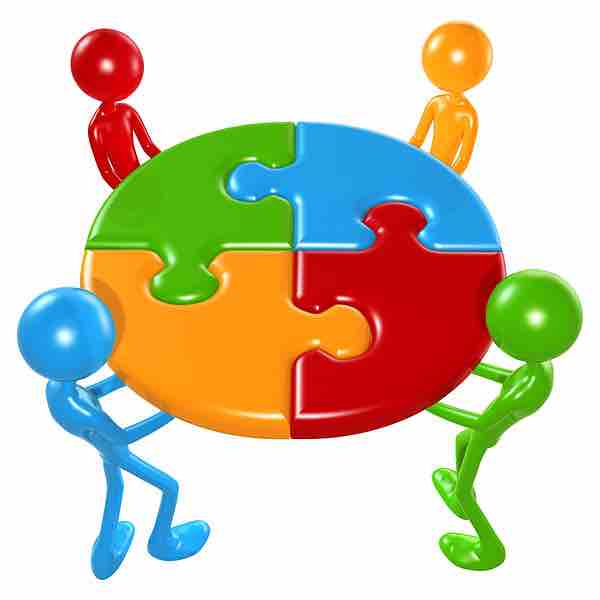Teamwork involves a set of tasks and activities performed by individuals who collaborate with each other to achieve a common objective. That objective can be creating a product, delivering a service, writing a report, or making a decision. Teamwork differs from individual work in that it involves shared responsibility for a final outcome.

Teamwork
Human skill involves the ability to work effectively as a member of a group and to build cooperative effort in a team.
Teamwork Processes
While the substance of the tasks involved in teamwork may vary from team to team, there are three processes that are common to how teamwork gets done: the transition process, action processes, and interpersonal processes. During each of these processes, specific sets of activities occur.
1. The transition process is the phase during which a team is formed. Activities include:
- Mission analysis: establishing an understanding of the overall objective
- Goal specification: identifying and prioritizing the tasks and activities needed to achieve the mission
- Strategy formulation: developing a course of action to reach the goals and achieve the mission
2. Action processes comprise the phase during which a team performs its work. Activities include:
- Monitoring milestones and goals: tracking progress toward completion of tasks and activities
- Monitoring systems: tracking the use of resources such as people, technology, and information
- Coordination: organizing and managing the flow of team activities and tasks
- Team monitoring and support: assisting individuals with their tasks by, for example, providing feedback and coaching
3. Interpersonal processes include activities that occur during both the transition and action processes. These include:
- Conflict management: establishing conditions to avoid disagreement and resolving conflict when it occurs
- Motivation and confidence building: generating the willingness and ability of individuals to work together to achieve the mission
- Affect management: helping team members to regulate their emotions as they work together
Characteristics of Effective Teamwork
An effective team accomplishes its goals in a way that meets the standards set by those who evaluate its performance. For instance, a team may have a goal of delivering a new product within six months on a budget of $100,000. Even if the team finishes the project on time, it can be considered effective only if it stayed within its expected budget.
Effective teamwork requires certain conditions to be in place that will increase the likelihood that each member's contributions—and the effort of the group as a whole—will lead to success. Effective teams share five characteristics:
- Shared values:a common set of beliefs and principles about how and why the team members will work together
- Mutual trust: confidence between team members that each puts the best interest of the team ahead of individual priorities
- Inspiring vision:a clear direction that motivates commitment to a collective effort
- Skill/talent:the combined abilities and expertise to accomplish the required tasks and work productively with others
- Rewards:recognition of achievement toward objectives and reinforcement of behavior that supports the team's work
Effective teamwork requires that people work as a cohesive unit. These five characteristics can help individuals collaborate with others by focusing their efforts in a common direction and achieving an outcome that can only be reached by working together.